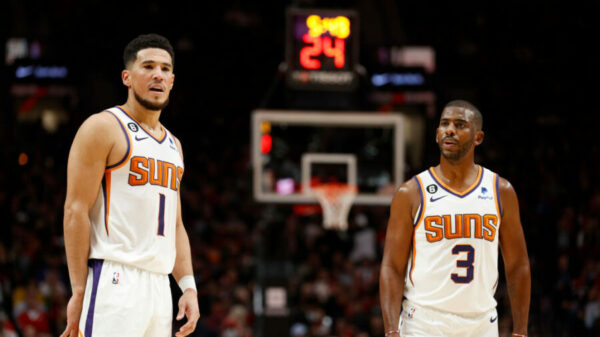Most Phoenix Suns fans learned this word last season. A team’s clutch-time record only includes games within five points in the last five minutes. Games that might go either way.
Phoenix was historically great in 2021-22. It was 33-9, the fourth greatest in NBA.com’s 1997 database.
Three all-time regular season teams—the 2015-16 Golden State Warriors (30-4, 88.2%), 2006-07 Dallas Mavericks (32-6, 84.2%), and 2012-13 Miami Heat (32-8, 80%)—joined it.
The Suns have struggled this year despite having the same key players. OK. If it continues, how can it be historic?
Phoenix has gone from best in crunch time to worst in the NBA at 13-17.
First, asterisks. Only 10 of the Suns’ 71 games have had a healthy starting five. That and Kevin Durant’s latest injury three games into adjusting to him have impacted the team’s flow.

Phoenix has gone from the best in crunch time
But, this doesn’t explain Phoenix’s stunning lack of execution compared to last year. Philadelphia has lost four of its previous five games, and while only three were clutch, the fact that they didn’t come down to the last possession or two is even more surprising.
That required some grueling runs. The Suns are 6-5 since the All-Star break despite being 11th in offensive and 10th in defensive rating.
A March 11 defeat to Sacramento was knotted at 115 with 3:39 left. The Kings led six with 45 seconds left.
At 3:57 in the third quarter, Golden State led 87-84. The Warriors lead by 12 minutes into the fourth quarter.
On the 14th against Milwaukee, a 97-97 deadlock at 6:48 became a nine-point Bucks lead after two minutes.
On Sunday at Oklahoma City, Phoenix moved from up 10 at 10:52 to a 113-104 Thunder lead at 4:39, a 19-point swing in six minutes.
Durant isn’t out. His exchanged things are gone. The Suns are a good club that looks poor in a crucial moment.
Injuries? Although nearly everyone missed time last year, just two Suns played at least 70 games. Despite the massive in-season transaction, Phoenix is on track for five.
Last year’s absences and durations were not as big as they are today, but the 64-win Suns continued building them up either way and truly understood how to when it counted.
Why can’t the Suns? NBA.com’s analytics revealed more.
This season’s crucial figures lack last year’s statistical aberrations. Don’t let statistical outliers deter you. The Suns were exceptional in one area.
Instead of looking at Phoenix games where the Suns were within five points in the last five minutes last season, we will first look at ones that were tied or had a five-point Suns deficit.
16-9 in catch-up games, the Suns were great. Seven games above.500. The Suns were the only NBA club to surpass that threshold last year. While late-game comebacks are hard, the average victory rate was approximately 30%. Phoenix has 64%.
This year? Unfortunately, 16-9 has slipped to 5-17, a 22.7% victory rate that ranks bottom five in the league.
Let’s look around. Premium shot-making usually determines these outcomes. Did the shooters and their efficiency change? Both yes and no.
In games last year where the Suns were tied or behind by five points or fewer in the last five minutes, Devin Booker (12-of-25, 48%), Chris Paul (9-for-17, 52.9%), and Mikal Bridges (13-of-17, 76.5%) led the field goal attempts.
This year, Booker (15-for-30, 50%), Deandre Ayton (12-of-23, 52.2%), and Paul (7-of-17, 41.2%). Ayton tried eight such shots last season (and made all of them).
We’ll examine those figures again. Nothing significant.
The killer execution is absent. Phoenix shot 60.4% in 58 minutes to finish 16-9 in comeback games. This year, the 5-17 outcome in 65 minutes is a 42.9% field goal percentage, a significant dropoff to an average-ish return rate. The defensive rating dropped from 100.8 to 106.3 but not enough to suggest a problem. On offense, 12.9 turnovers drop to 16.3%. Problematic.
That’s also expected. Phoenix should improve this season. Last year was an outlier and the law of averages applies to everyone.
When the Suns are in control, the shifts are more noticeable.
Phoenix was a stunning 33-4 in games it tied or led in the last five minutes by five points or fewer in 2021-22. Its 125.7 offensive rating and 93.0 defensive rating gave it a net rating of 32.7.
With a good 104.6 offensive rating and a bad 115.6 defensive rating, the net rating is -11.0 this season. The Suns are 13-13. NBA-worst 50% divide.
What’s wrong when they’re ahead or late?
Last year, Paul (19-for-32, 59.4%), Booker (18-of-31, 58.1%), Bridges (12-21, 57.1%), and Ayton (12-16, 75%) finished teams.
Booker (8-for-29, 27.6%) and Paul (7-of-21, 33.3%) struggled this time. Ayton (14-of-24, 58.3%) hasn’t. Bridges (10-for-20, 50%) followed suit before leaving.
Booker and Paul’s percentages shouldn’t be utilized to criticize their play this year. Giannis Antetokounmpo (12-for-40, 30%), Stephen Curry (12-for-35, 34.3%), and Ja Morant (11-of-36, 30.6%) all have terrible clutch shooting percentages.
This season, the Suns have struggled to win games in the last minutes.
Numbers are numbers. Paul always had this eye-test time. He orchestrates everything, whether it concerns him or not. Ayton’s success this year suggests Paul deferred more. He runs the two-man game with the big, and Paul’s year-to-year inconsistency with 1) getting to his jumper in rhythm and 2) making it will hurt him most when the game is on the line, when he has always been one of the greatest.
As we said, Booker’s significant dip wouldn’t be as concerning if his averages weren’t still good when the team is down.
The Suns have Durant, which is fantastic news, like everything else. Phoenix’s postseason three-headed serpent is impressive. Can Durant fix this season’s problems?

